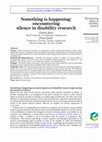Papers by Fiona N Cheuk

Qualitative Research Journal, Jun 24, 2020
Purpose-Often, researchers view silence as antagonistic to equity-aimed projects. Because verbal,... more Purpose-Often, researchers view silence as antagonistic to equity-aimed projects. Because verbal, written, and textually agentive communications are presumed to be the most valid qualitative-research data, moments of silence are under-analyzed. Yet, we argue that silence holds meaning as data and that it is a valid, rich form of communication. Design/methodology/approach-Through this reflective analysis of silence, we invite readers to reconceptualize silence in research from a critical disability-research perspective with emphasis on crip willfulness. We introduce silence as an interpretive, agentive and relational gesture. Findings-We attend to silence as necessary in all research because it helps researchers excavate able-bodied expectations about communication in qualitative-data-collection practices. Originality/value-We demonstrate that silences in research can be an interpretive, relational, and agentive gesture that can teach us about taken-for-granted assumptions about research practices. Revisiting our research encounters with this framing of silence informed by critical disability studies allows us to question how traditional social science research methods value some modalities of expression over others. Rather than viewing silence in research as moments when nothing happens, we show that silence indicates something happening and is valid data.
Canadian Journal of Disability Studies, Jun 17, 2014
Canadian Journal of Disability Studies, Apr 28, 2019
Disability is often absent in both the content and the production levels of Western film and tele... more Disability is often absent in both the content and the production levels of Western film and television media, and other popular cultural productions. They rarely include disability except as plot devices that invoke ableist tropes such as: tragedy, pity, or a temporary challenge for non-disabled characters to overcome, or as lessons for the main character to learn from, and many more. In the Ruderman white paper on Employment of Actors with Disabilities in
Critical Disability Discourses Discours Critiques Dans Le Champ Du Handicap, Oct 23, 2012
Since the 1990s there has been an increase of cis-gendered women participating in higher educatio... more Since the 1990s there has been an increase of cis-gendered women participating in higher education, and female university graduates currently outnumber males (Turcotte, 2011). However, these demographics do not consider disability, race, sexualities, and/or other marginalized group differences nor do they reflect the embodied experiences of women who continue to experience sexism, racism, ableism, and homophobia within the ivory tower. Presumed Incompetent:

Critical Disability Discourse/ Discours Critiques Dans le Champ Du Handicap, Oct 2013
The dominant assumption about self-disclosure asserts that sharing information about oneself is s... more The dominant assumption about self-disclosure asserts that sharing information about oneself is solely a matter of individual choice. However in the context of identity disclosures, the aspect of self that is being disclosed is attached to the backdrop of the socio-political environment of which the act and agent are situated in. In this regard, it becomes questionable whether people disclosing socially stigmatized and devalued identities such as disability are truly matters of individual freedoms around choice making. This paper aims to highlight how opportunities for discussing experiences and issues involving one’s disability identity are limited to formalized institutional spaces or silenced in informal spaces due to the authority of medical cognition around disability within western societies. This lessens the control and authority of disabled people over the way in which disability is understood within the society as a homogenized identity defined through third-party authorities and cannot reflect the complex and nuanced identities formed through lived experiences. By examining the parameters of self-disclosure surrounding opportunities to claim and discuss one’s identity with the inclusion of disability(ies), discourses of self-disclosure can be pushed towards informal interpersonal spaces rather than limited formal spaces so as to weaken the attitudinal barriers which form the basis for disabling social structures and creates unequal citizenship.
Keywords: Self-Disclosure, Disability, Identity-Politics, Freedom of Choice, Citizenship.
Drafts by Fiona N Cheuk
Major Research Paper by Fiona N Cheuk

Abstract
Currently, disability is often represented as a difference-neutral identity based on Eu... more Abstract
Currently, disability is often represented as a difference-neutral identity based on Eurocentric ideologies and embodiment within media representations, academic research, and policy spaces (Bell 2006, Dossa 2006, Meekosha 2011). The centrality of this singular Westernized subject as representative of all persons with disabilities manifests in tangible problems for the ethno-racialized transnational disabled subject within Canada in regards to representation and social location. Feminist standpoint theory, as a methodological practice in disability research has the potential to situate it among the multiplicities of social identities that are present within embodied encounters with racialized and ableist Canadian spaces. Using the everyday experiences shared by three Chinese-Canadians with disabilities situated against the backdrop of a nation-state built on racist and colonial policies; this paper explores the narrators’ embodied encounters with what Dorothy Smith defined as “those socially situated practices that organize and coordinate the orientation of the subjects.” (1993, p. 44) I argue that these narrative moments highlight complex processes of rupture, tension, and fluidity between rigid borders delimiting social identities and racially politicized spaces. In doing so, this piece calls for rethinking issues of disability, gender, and racialization as discourses that ought to be read in conversation with each other rather than apart and apoliticized.








Uploads
Papers by Fiona N Cheuk
Keywords: Self-Disclosure, Disability, Identity-Politics, Freedom of Choice, Citizenship.
Drafts by Fiona N Cheuk
Major Research Paper by Fiona N Cheuk
Currently, disability is often represented as a difference-neutral identity based on Eurocentric ideologies and embodiment within media representations, academic research, and policy spaces (Bell 2006, Dossa 2006, Meekosha 2011). The centrality of this singular Westernized subject as representative of all persons with disabilities manifests in tangible problems for the ethno-racialized transnational disabled subject within Canada in regards to representation and social location. Feminist standpoint theory, as a methodological practice in disability research has the potential to situate it among the multiplicities of social identities that are present within embodied encounters with racialized and ableist Canadian spaces. Using the everyday experiences shared by three Chinese-Canadians with disabilities situated against the backdrop of a nation-state built on racist and colonial policies; this paper explores the narrators’ embodied encounters with what Dorothy Smith defined as “those socially situated practices that organize and coordinate the orientation of the subjects.” (1993, p. 44) I argue that these narrative moments highlight complex processes of rupture, tension, and fluidity between rigid borders delimiting social identities and racially politicized spaces. In doing so, this piece calls for rethinking issues of disability, gender, and racialization as discourses that ought to be read in conversation with each other rather than apart and apoliticized.
Keywords: Self-Disclosure, Disability, Identity-Politics, Freedom of Choice, Citizenship.
Currently, disability is often represented as a difference-neutral identity based on Eurocentric ideologies and embodiment within media representations, academic research, and policy spaces (Bell 2006, Dossa 2006, Meekosha 2011). The centrality of this singular Westernized subject as representative of all persons with disabilities manifests in tangible problems for the ethno-racialized transnational disabled subject within Canada in regards to representation and social location. Feminist standpoint theory, as a methodological practice in disability research has the potential to situate it among the multiplicities of social identities that are present within embodied encounters with racialized and ableist Canadian spaces. Using the everyday experiences shared by three Chinese-Canadians with disabilities situated against the backdrop of a nation-state built on racist and colonial policies; this paper explores the narrators’ embodied encounters with what Dorothy Smith defined as “those socially situated practices that organize and coordinate the orientation of the subjects.” (1993, p. 44) I argue that these narrative moments highlight complex processes of rupture, tension, and fluidity between rigid borders delimiting social identities and racially politicized spaces. In doing so, this piece calls for rethinking issues of disability, gender, and racialization as discourses that ought to be read in conversation with each other rather than apart and apoliticized.